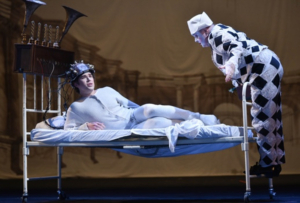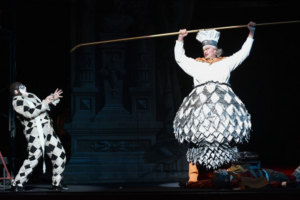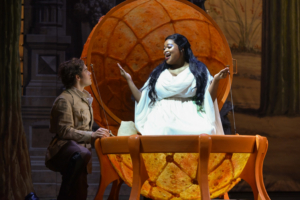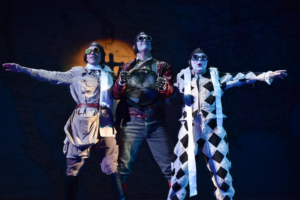BWW: Apples, ORANGES--Opera Philadelphia's O19 Shows Us What the Difference is

(Jonathan Johnson). Photo: Kelly & Massa
If you can imagine Rossini's IL BARBIERE DI SIVIGLIA with all its comedy but without any of its great arias, you can begin to imagine why Sergei Prokofiev's LOVE FOR THREE ORANGES isn't only anyone's top-ten list of favorite operas. (It also has never been done in Philadelphia before.)
Yet Alessandro Talevi's wild-eyed production at Opera Philadelphia's O19 Festival somehow manages to make the audience laugh itself silly and tap its feet with glee at the famous march that was such a big hit in the composer's time, that he grew sick of it.
Oh sure, there are bright spots in the music--besides the march--but it isn't exactly a score that shows off the best qualities of the voice for most of the people in the cast, despite the efforts of the singers, music director Corrado Rovaris and the opera orchestra and chorus. Yes, some do better than others, but it seems out of sheer luck rather than through the help of the composer.

Banks. Photo: Kelly & Massa
That's a puzzlement, of course, since Prokofiev's known for such marvelous orchestra works as the ballet ROMEO AND JULIETTE, Op. 64--particularly the music for the Capulets and Montagues--and his Symphony #5 (not to mention all those fabulous piano concerti). But new country, new composer, I guess, since he wrote it for Chicago's Auditorium Theatre, where it appeared on December 30, 1921 in French, L'AMOUR DES TROIS ORANGES; it was thankfully done in English (a zippy one by David LloydJones) at the Academy of Music in Philadelphia last week. And the composer, in a playful mood, takes swipes at Wagner, Strauss and a few others.
The story is pretty simple: The prince and heir to the throne (tenor Jonathan Johnson in silliness and sadness) is dying of melancholy. The king the serious bass Scott Conner) summons the court jester, Truffaldino (the fine and amusing tenor Barry Banks), to cure his son, toute suite. Of course, he does not know that there are other forces at work wanting the power for themselves, the magician Chelio (the wily Brent Michael Smith) and the witch Fata Morgan (the evil, bewitching mezzo Wendy Bryn Harmer), who curses the prince, making him fall obsessively in love eith three oranges.

Townsend. Photo: Kelly & Massa
On the whole, director Talevi--who conceived the production for closing of the Maggio Musicale Theatre in Florence--kept the ball rolling,. There are bows to everything from impatient theatre fans arguing over the kind of show they want to see in the prologue to a kind of Dora the Explorer as the prince and Truffaldino go off to try to find the royal's appropriate life with a princess. The three oranges/princesses are the excellent soprano Tiffany Townsend as Ninetta, with contralto Alissa Anderson and mezzo Kendra Broom as the other two princesses.

Barry Banks. Photo: Kelly & Massa
As the prince and Truffaldino search, they meet various odd characters along the way, such as the demon Farfarello (a funny bass-baritone Ben Wager) , who blows the prince to the hiding place of the oranges, with special mention going to bass Zachary James as the hilarious cook made to look like a chicken.
Justin Aienti did a fine job, with Giuseppe Calabro's lighting, with the colorful set--that showed the action in front of and behind the scenes. According to the program, the director Talevi chose the setting with the chaos in Prokofiev's own life on his mind--and chaotic is certainly an apt description for the goings on. Manuel Pedretti's costumes were mostly fine or hilarious, though I wish his three oranges--enclosing the three princesses--looked less like Faberge Eggs and more like fruit. (I got the allusion but it didn't quite work for me.)
LOVE FOR THREE ORANGES is never going to find a regular place in the repertoire of major opera houses (though the old New York City Opera brought it back many times). Still, when it's done in so stylish and enjoyable a production as this, it's nice to run in to time and again.
Videos

